There is no other industry quite like real estate. Where else can family businesses and scrappy startups compete head-to-head with international mega-firms? The secret to this unique situation is that real estate, more than any other industry, is built on personal relationships, trust, and local knowledge. As long as you provide the superior service that homeowners and home buyers need, your brokerage can thrive in any environment.
But providing that quality of service isn’t easy! To consistently delight clients, you need to pack your brokerage with the best agents available: the kind of go-getters who know the area, understand the market, and thrive on forging meaningful bonds with their clients. Once you’ve attracted that kind of talent, you want to make sure they stick around — and that means keeping your agents happy.
How can you tell whether your agents are happy? That’s easy! All you have to do is ask them.
In this post, we will show you how to get clear, easy-to-interpret feedback from your agents that will help you understand how well you’re meeting their needs, and what you can do to improve. Even better, we will provide a FREE Agent Engagement Survey template that you can easily brand and share with your own agents.
Let’s get started!
The five dimensions of agent happiness
At Placester, we have the opportunity to talk to a lot of agents and brokers. In those conversations, we’ve found some consistent threads that come up again and again. These are the five dimensions of agent happiness:
- Support: Do I have the tools, technology, and training I need to do my job?
- Compensation: Am I receiving a competitive pay and benefits package from my brokerage?
- Workload: Do I have enough clients and leads that I’m busy, but not so many that I’m overworked?
- Marketing: Does my brokerage help me promote my business and build my personal brand?
- Professional development: Does my brokerage offer me opportunities to learn and grow?
A brokerage that succeeds at satisfying these needs for its agents will find it much easier to keep their agents active and engaged — and to attract new, high-performing talent to the brokerage. We designed our Agent Engagement Survey to quickly and easily measure how well you’re meeting your agents’ needs along these five dimensions.

Employee Net Promoter Score (eNPS)
It can be challenging to quantify exactly how happy you are with your job. Sometimes it changes day to day. So, instead of having people directly rank their employee satisfaction, we ask a different question: How likely would you be to recommend working here to someone else?
This gives you a metric known as the Employee Net Promoter Score, or eNPS. This gives you a quick measure of how happy your employees are without making them feel like they’ve been put on the spot.
eNPS builds on the Net Promoter Score, a metric designed to measure customer loyalty, and it works much the same way. You ask one simple question: “On a scale of 1 (not likely) to 5 (very likely), how likely are you to recommend working at this brokerage to a friend or colleague?”
- 1-3: These are your Detractors. They are unhappy agents who may be having a negative impact on morale.
- 4: These are your Passives. They are reasonably happy agents, but you might be at risk of losing them if a better offer comes along.
- 5: These are your Promoters. They are your happiest agents, keeping morale high and attracting new talent to your brokerage.
To get your overall eNPS, simply calculate the percentage of responses in each of these categories and subtract the percentage of Detractors from the percentage of Promoters.
For example, say I survey 20 agents. 6 of my agents are Promoters, 10 are Passives, and the remaining 4 are Detractors. My eNPS would be 5 (30%-25%). That calculation looks like this:
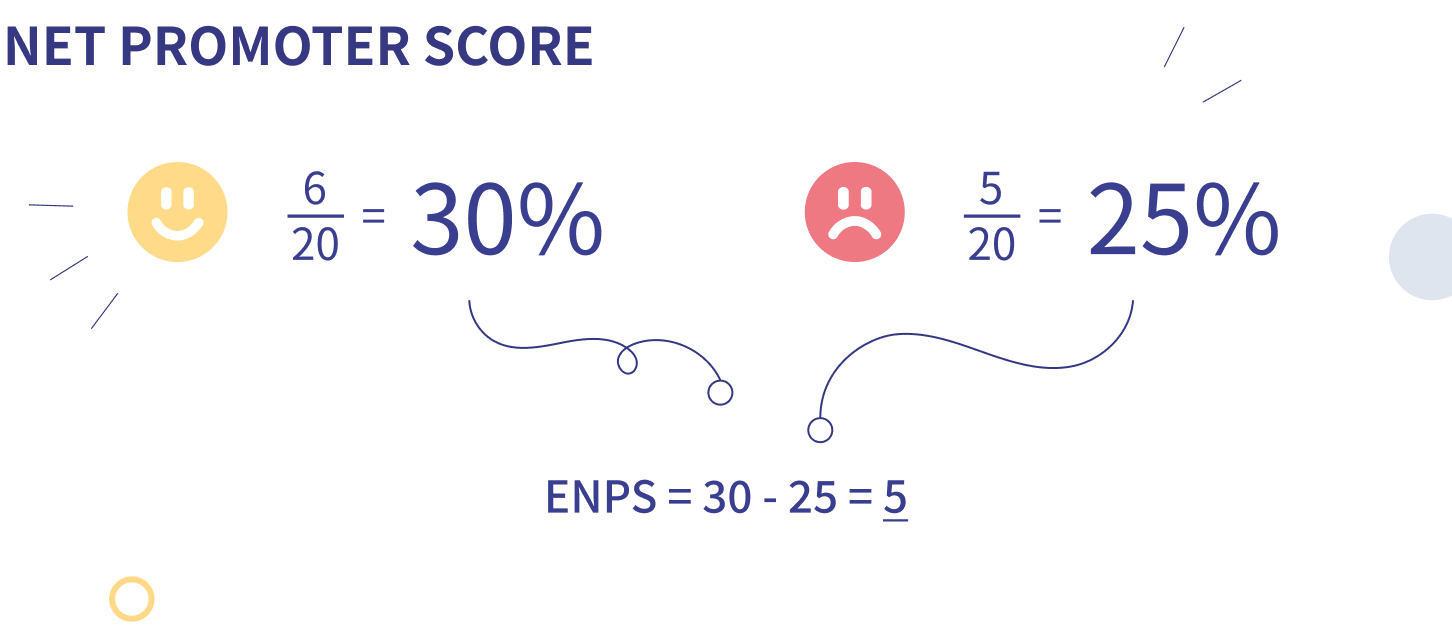
In the beginning, your eNPS may be quite low — or even negative. The important thing is that, once you know what it is, you can work to make it even better.
Get the survey
Ready to get started? That’s great! Just make sure you’re logged in to your Google account, and make a copy of the Agent Engagement Survey template. When prompted, save a copy of the survey to your own account.
We do recommend that you update the styling of the form to fit your brokerage brand.
While most survey platforms have the ability to change the header image, background, and some limited font options, with a little effort you can really make your form look really nice!
If you are not a graphic designer, check out Placester’s Services Marketplace to hire one of our designers to do it for you. If you want to DIY, we recommend using Canva to create the form graphics. The Canva “Leaderboard” template works really well with Google forms.
Another trick you can try is adding emoji to your form questions and answer choices. You might use the fire ???? and pointing-hand ???? symbols to emphasize important information or numbers in highlighted blocks if you have a set of steps you want to clearly explain.
Emojipedia is what we use to access emoji icons on any device.
Please note that if you make any changes to the content of the form, such as rearranging or rewording questions, our scoring sheet template may not work.
Once you feel comfortable with the look and feel of your survey, it’s ready to send! Click the big “Send” button in the upper right corner and either use the Send via email feature, or toggle to the link icon to copy a URL that you can share with your Agents via email, Slack, or any internal messaging system:

Getting your agents excited about giving feedback
When you’re ready to kick off your Agent Engagement Survey, make sure your agents are engaged in the process. This is all about them, after all! We recommend launching the survey with an upbeat email to the team, something like this:
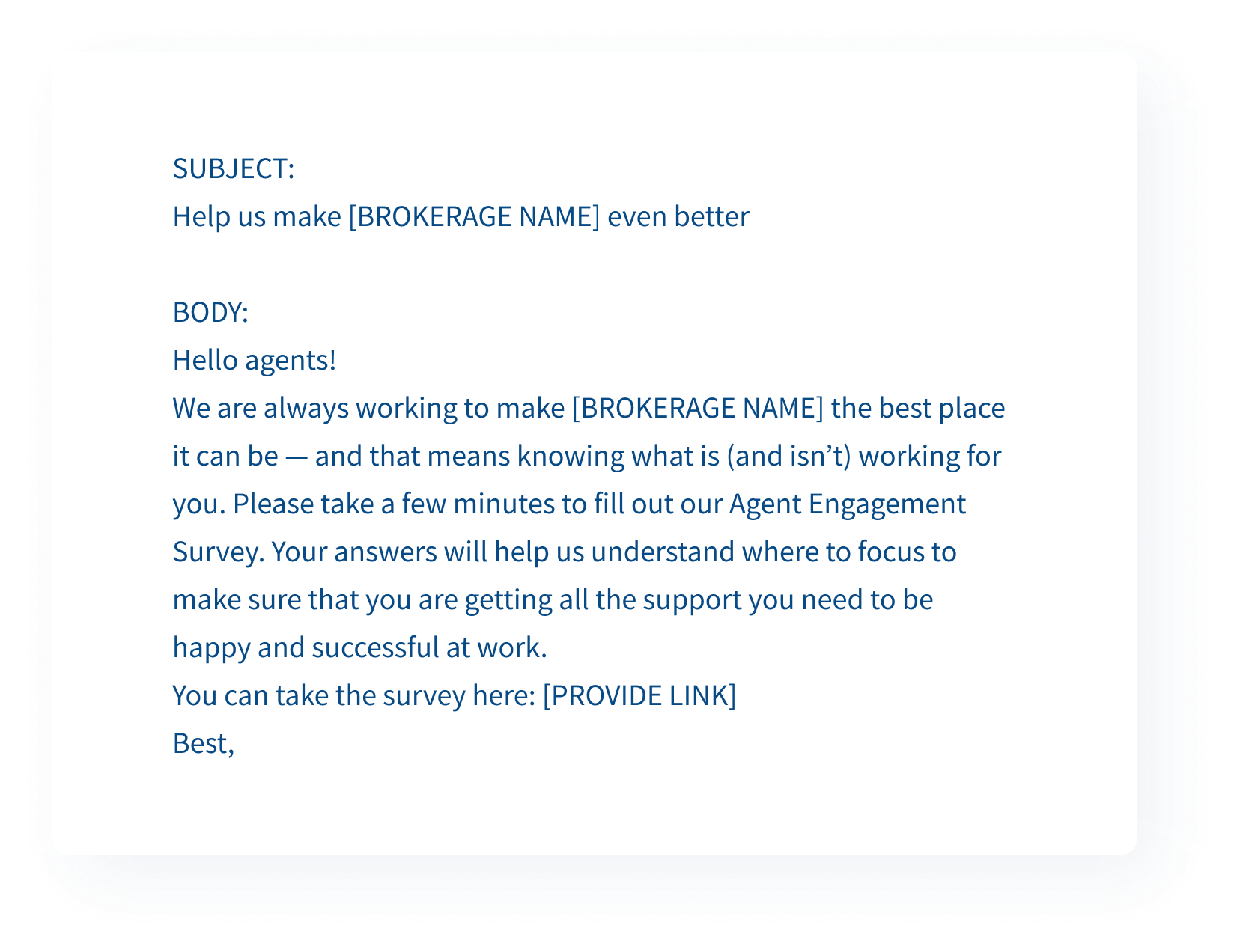
Maybe your agents are already excited to tell you what they think. In that case, great! Simply share the survey with them, and you’re ready to go. If, however, your agents are very busy or otherwise reluctant to provide feedback, you might want to offer an incentive. For example, you could enter everyone who completes the survey into a raffle for a $100 Amazon gift card or other prizes. Or, if you want to make sure it feels like a team effort, you can offer a team spiff, such as a pizza lunch or after-work happy hour if at least 90% of the agents complete the survey.
How to score the Agent Engagement Survey
While you can use any survey platform to run your Agent Engagement Survey, we recommend using Google Forms — it’s free, it’s easy to use, and best of all, it makes it easy to check your responses.
To review each individual question, simply open the survey editor and toggle from the “Questions” tab to the “Responses” tab.
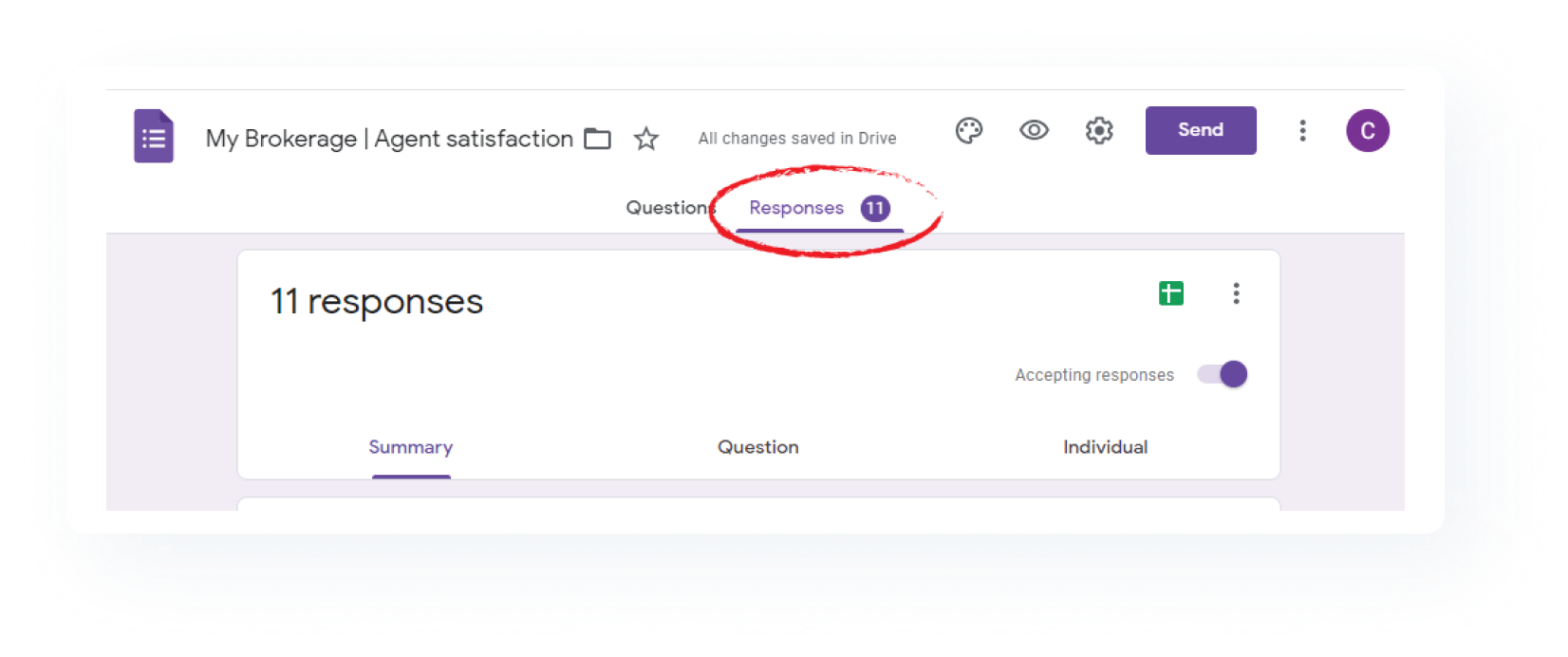
Each question in the Agent Engagement Survey corresponds to one of the five dimensions of agent happiness:
– Support
- I have access to the resources I need to be successful
- I understand how to use the tools and technology that the brokerage makes available
- The tools and technology provided by my brokerage make me more productive and successful
– Compensation
- My salary here is competitive with what I would expect to receive at another brokerage
- My benefits package here is competitive with what I would expect to receive at another brokerage
- My brokerage helps me plan for my financial future and prepare for retirement.
– Workload
- I don’t have to worry about where the next lead will come from
- I never feel overwhelmed by the level of work my job demands of me
- My clients are happy with the service I provide
– Marketing
- My brokerage helps me promote my services and attract new business
- My brokerage helps me build my personal brand
- I understand how my personal brand works to support the brokerage brand — and vice-versa
– Professional development
- I have all the skills and knowledge I need to be excellent at my job
- I feel stimulated and supported by my colleagues at the brokerage
- I have ample opportunities to learn new skills and stay on top of new trends in real estate
A high rate of 4s and 5s tells you that you’re doing well! Your agents are happy, and you are well positioned to attract and retain top talent.
A high rate of 3s, 2s, or 1s indicate areas that need some attention. Low scores in support might be a sign that you need to spend more time onboarding new agents so they understand how to use the tools you provide. Low scores in professional development tell you that your agents don’t feel prepared for success in the modern marketplace, and you should provide them with additional opportunities for training and development. For more detailed advice on upping your game in all five dimensions of agent happiness, download our Boutique Broker’s Guide to Delighting Agents and Winning Star Talent.
For your eNPS, scroll to the bottom of the results to find the eNPS responses, then calculate your score as described above. Or, if you feel comfortable using spreadsheets, we’ve prepared a simple calculator to do the work for you:
1. To create a spreadsheet of your responses, click the Google Sheets icon at the top of the Responses tab:
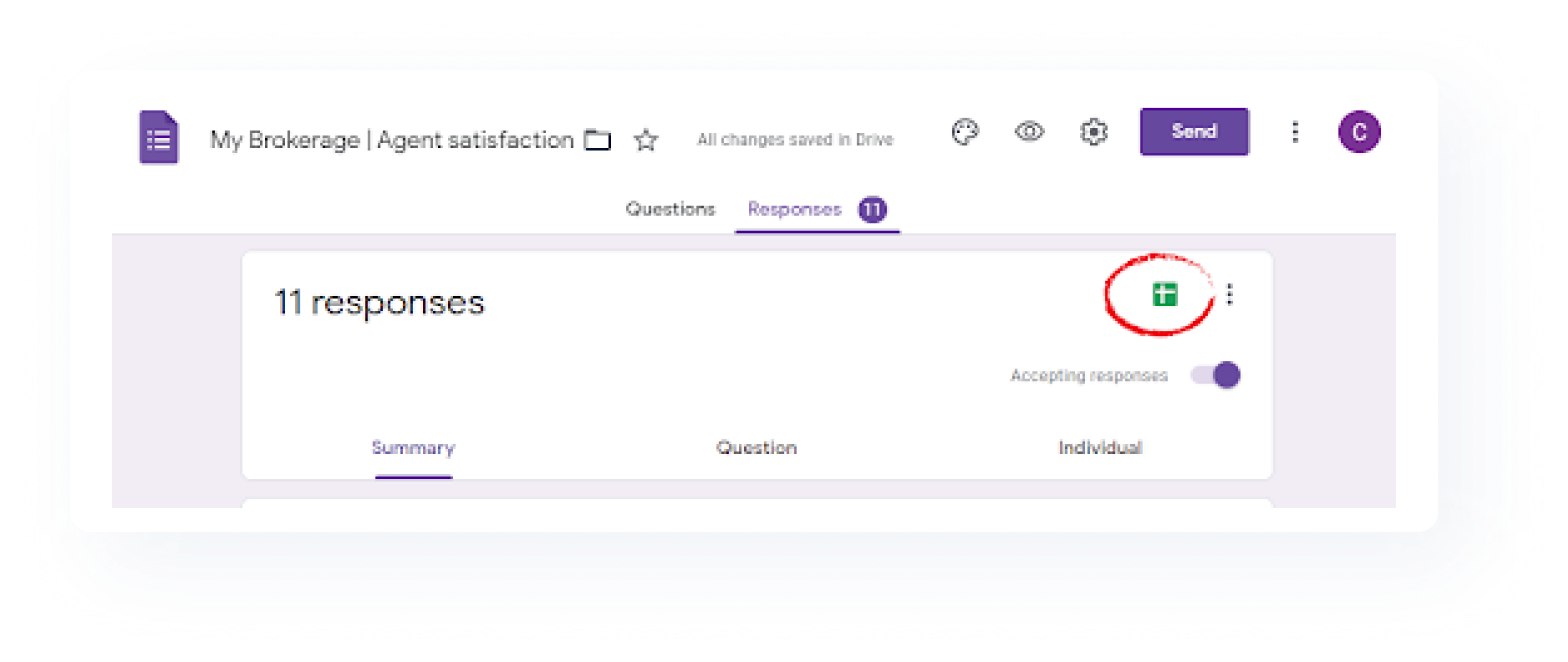
- In the prompt, click Create. Open it right away, and give your spreadsheet a name you will remember, like “Agent Engagement Survey, Summer 2021.”
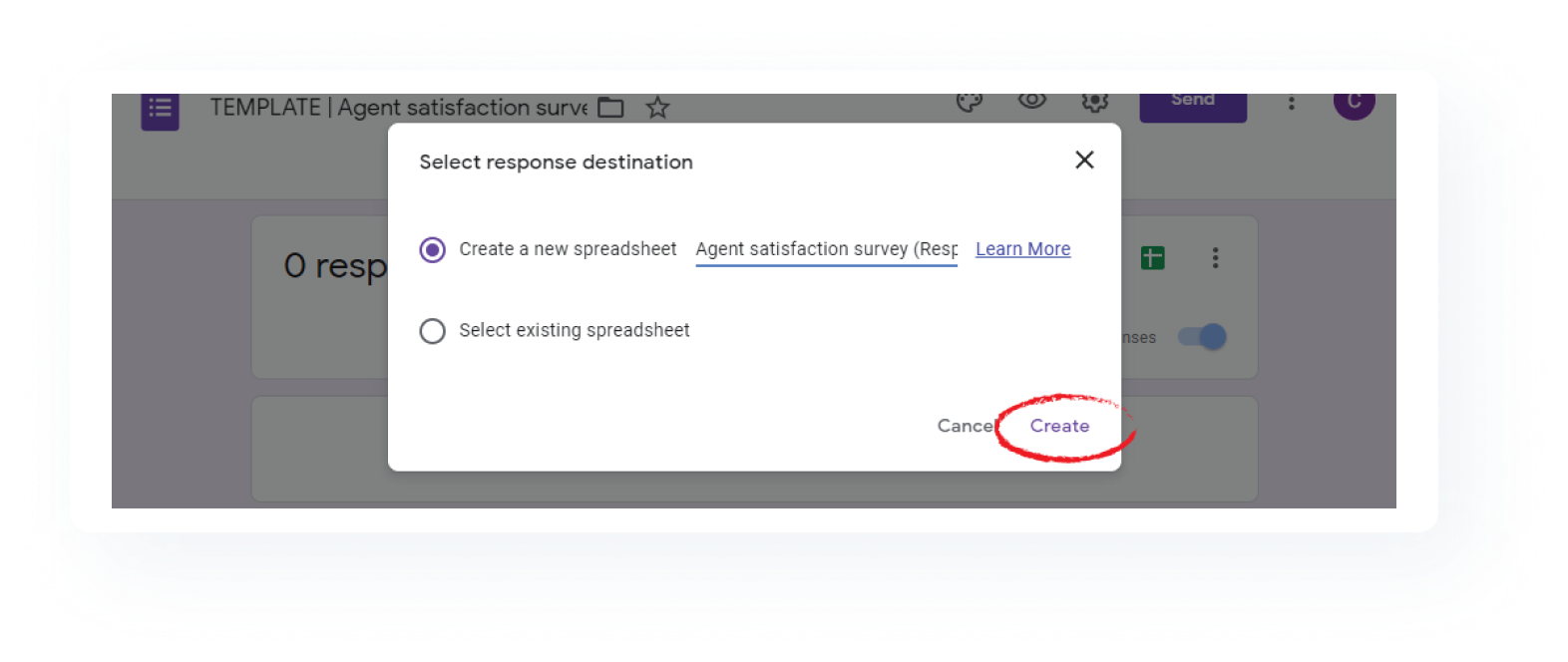
- Download a copy of the Agent Engagement Survey scoring sheet.
- Open the options on the AES Scoring tab, and select Copy to > Existing Spreadsheet, then choose the responses sheet you created and named in step 2:
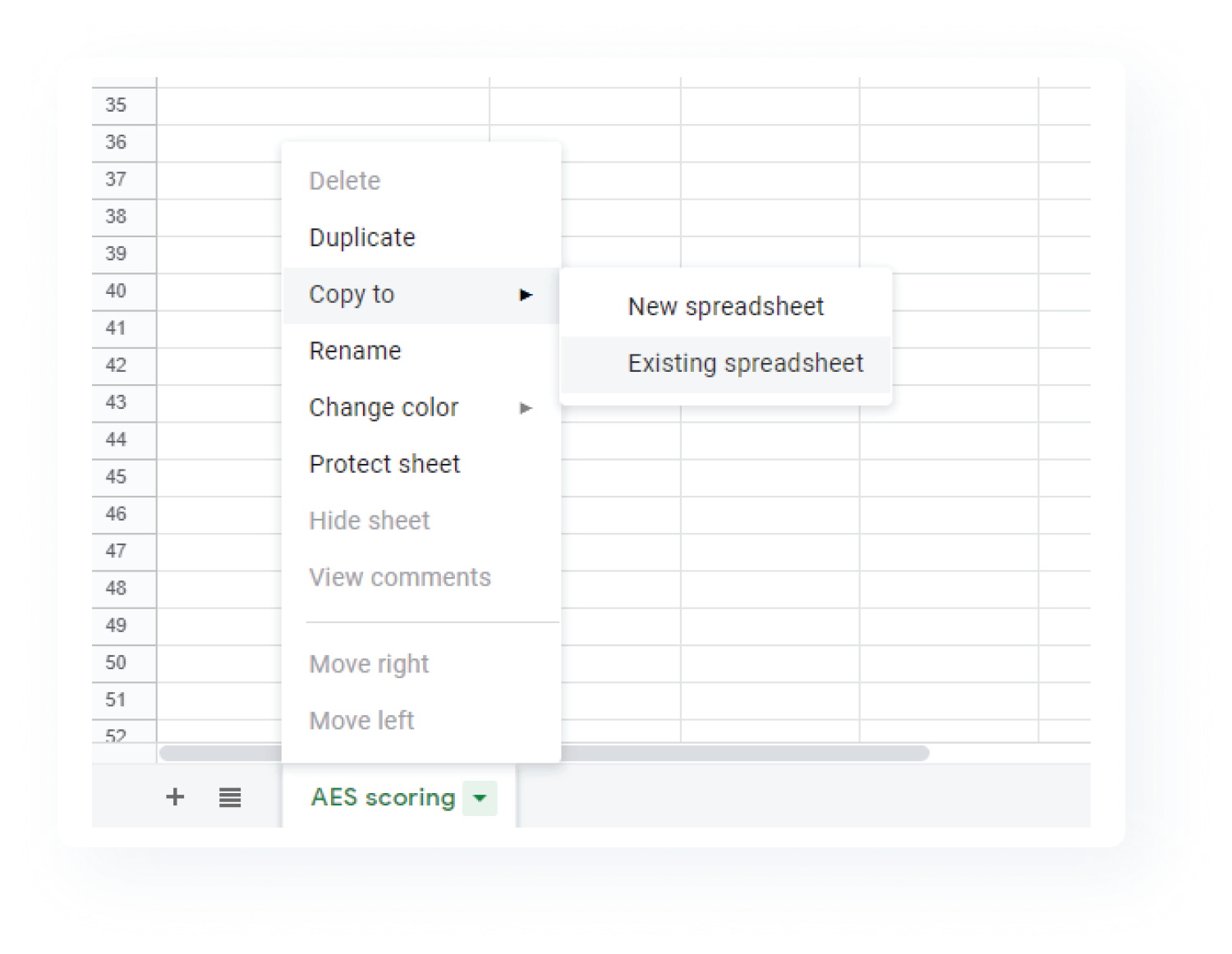
- Open the sheet you created in step 2, switch to the AES scoring tab, and all your responses will be calculated for you! This will automatically update if any new responses come in, so you don’t have to do anything else.
Taking a pulse of agent engagement
If you just want to get a quick sense of agent engagement — for example, if you want to do a quarterly temperature-taking between full annual Agent Engagement Surveys — you can always send around a pulse survey.
A pulse survey measures all the same dimensions as the full survey, but it’s much shorter and less detailed. At a brisk six questions, it should take agents five minutes or less to complete.
To get your copy of the pulse survey, start here. Make sure you are logged into your Google account, and save a copy of the survey when prompted. See the section above on the full survey for advice on styling the pulse survey to fit your brokerage brand.
With just six questions, scoring is pretty straightforward. But we did prepare a simple pulse survey scoring sheet template to get you started.
What comes next?
When it comes to agent engagement, the survey is just the beginning. So show your agents you care by acting on the feedback they give you!
The first step is to share the high-level results of the survey with the entire team. Feedback should always be a safe space, so this should be the final, aggregate results only, with no specifics and no names. If you want to share quotes from the open feedback form, do not attribute them to the agent or agents who wrote them.
Even if your survey scores weren’t great, it’s important to let everyone know how it went. After all, you aren’t telling them anything they don’t already know. Keep your tone positive and professional, and emphasize that this is part of learning and improving. Your agents will respect your transparency.
Next, you will want to communicate your game plan for what comes next. Explain to your agents how you are going to double down on the areas where the brokerage is already performing well. In the areas where your performance wasn’t as strong, tell your agents that you’ve heard their concerns, and you have a strategy for improvement. If you need some pointers or ideas, our Boutique Broker’s Guide to Delighting Agents and Winning Start Talent combines some best practices, tips, and advice for delighting your agents from top-performing brokerages around the country.
And, finally, you need to follow through on your plans. Your agents don’t need you to be perfect, but they do have every right to expect that you will continue doing everything you can to make them — and the brokerage successful.
And that’s all there is to it! By listening to your agents and putting the focus on their happiness, year after year, you can make sure your brokerage is competitive and successful far into the future.





